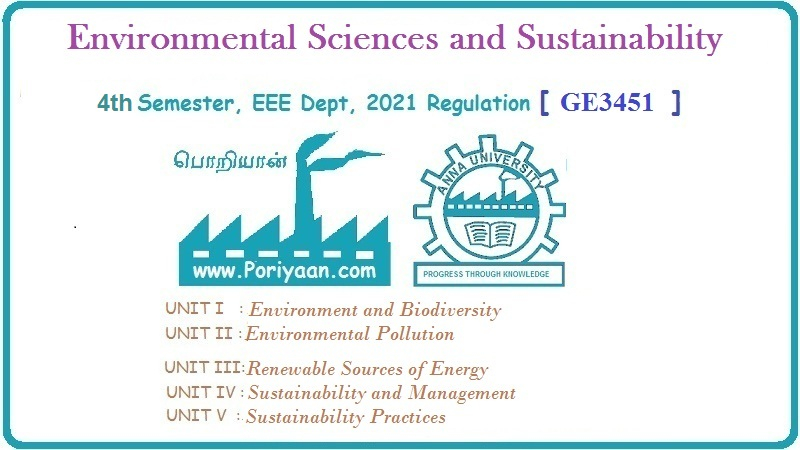Environmental Sciences and Sustainability: Unit II: Environmental Pollution
Environmental Pollution
Definitions, Examples, Classification
Pollution is defined as the excess discharge of any substance into the environment which affects adversely quality of environment and causing damage to humans, plants and animals.
UNIT II
Chapter – 2
Environmental Pollution
Syllabus
Causes,
Effects and Preventive measures of Water, Soil, Air and Noise Pollutions.
Solid, Hazardous and E-Waste management. Case studies on Occupational Health
and Safety Management system (OHASMS). Environmental protection, Environmental
protection acts.
Contents
2.1
Environmental Pollution
2.2
Water Pollution
2.3
Noise Pollution
2.4
Soil Pollution
2.5
Air Pollution
2.6
Biomedical Waste : Management and Handling Rules
2.7
Solid Waste Management
2.8
Occupational Health and Safety (OH&S)
2.9
Environmental Protection Act
2.10
Two Marks Questions with Answers
Environmental Pollution
•
Pollution is defined as any substance introduced into the environment that
adversely affects the usefulness of a resource.
•
Pollution can be in the form of solid, liquid or gaseous substance. Pollution
causes damage to human, plant and animal life. The nature and concentration of
pollutant determine the severity of effect of pollution.
Pollution is defined as the
excess discharge of any substance into the environment which affects adversely
quality of environment and causing damage to humans, plants and animals.
•
Terms used to describe pollution concentration are as under -
Examples
:
Industry pollution, automobile pollution, agriculture pollution, thermal
pollution etc.
1. Definition of Pollution
•
Ecologically, pollutants can be divided into three types :
1.
Bio-degradable or non-persistent pollutants
2.
Slowly degradable or persistent pollutants
3.
Non-degradable pollutants.
1.
Bio-degradable pollutants:
•
The pollutants that can be rapidly decomposed by natural processes is called
bio-degradable or non-persistent pollutants.
Examples
:
Domestic sewage, discarded vegetables etc.
2.
Slowly degradable pollutants :
•
Some pollutants remain in environment for longer time because they decompose
very slowly by the natural processes.
Examples
: Plastics, pesticides, etc.
3.
Non-degradable pollutants :
•
Some pollutants can not be decomposed by natural processes are called
non-degradable pollutants.
Example
:
Lead, mercury, nuclear wastes etc.
2. Classification of Pollution
•
The pollutants that pollute the environment is divided into following types.
1.
Air pollution
2.
Water pollution
3.
Soil pollution
4.
Marine pollution
5.
Noise pollution
6.
Thermal pollution
7.
Nuclear hazards
Environmental Sciences and Sustainability: Unit II: Environmental Pollution : Tag: : Definitions, Examples, Classification - Environmental Pollution
Related Topics
Related Subjects
Environmental Sciences and Sustainability
GE3451 ESS 4th Semester | 2021 Regulation | 4th Semester EEE Dept 2021 Regulation
